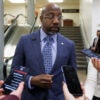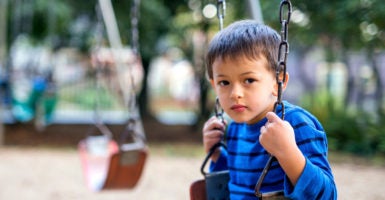It’s been 45 years since Roe v. Wade, and the pro-life movement is stronger than ever.
This week, thousands of pro-life Americans will take a stand for life at the annual March for Life in Washington, D.C. This year’s theme, “Love Saves Lives,” reminds us that women facing unplanned pregnancies have options besides abortion—like adoption—that protect life and demonstrate love.
Take Hannah Mongie, for example. She placed her son Tagg up for adoption after her boyfriend and Tagg’s father, Kaden, died suddenly. She created an emotional video telling Tagg her story before sending him home with his adoptive parents, Brad and Emily, “so that he would be able to look back and know that this decision was made purely out of love for him.”
Hannah wrote:
I hope anyone who watches this will be able to gain a new perspective on what the birth mom goes through when she places her child for adoption. It is the farthest thing from a heartless act. It shows [t]he definition of love. To love someone this much is to give away your happiness for them.
Stories like Hannah’s remind us that adoption gives everyone—expectant mothers, children, and adoptive families—the chance to experience life and love to the fullest.
Like any mother, Hannah had a unique set of needs and desires for her child. Through online resources, she was able to find a family that was “beyond anything [she] could have asked for,” given her “really, really high standards for anyone who is going to raise [her] child.”
Every mother should be afforded this wide range of options. Public policy needs to ensure that women facing an unplanned pregnancy have not only the option to adopt, but also to work with an organization that supports their unique needs.
That’s why a diversity of adoption agencies, including faith-based ones, is so important. Not only do they provide relief to the overburdened public foster care and adoption system, but they provide mothers and adoptive families with intangible yet invaluable resources: the spiritual, emotional, and relational support that state-run agencies are ill-equipped to offer.
But unfortunately today, some lawsuits and local policies are putting faith-based adoption agencies out of business. These agencies are unique within the industry, yet in very high demand.
In November 2017, the American Civil Liberties Union sued the state of Michigan over a law that allows faith-based adoption agencies to operate according to their belief that children should be placed with a mother and a father.
If the ACLU wins the case, it would drive highly successful faith-based adoption providers—which make up a quarter of adoption agencies in Michigan—out of business by forcing them to choose between their religious beliefs and fulfilling their mission.
This is not the first time faith-based providers have faced discrimination. In Boston, Illinois, and Washington, D.C., religious adoption agencies were forced to close their doors after decades of service when the state denied them the ability to place kids with a married mom and dad. Thousands of children were displaced in the process.
The ACLU alleges that the religious beliefs of faith-based agencies are preventing the children from finding loving homes. But a diversity of adoption providers actually increases the likelihood that these children will find homes.
Why is that? Because more providers means more agencies working to connect children and families, and that means more opportunities for kids to find homes.
Faith-based adoption agencies take nothing away from anyone. They do not prevent anyone from adopting or fostering children. Individuals or couples are free to work with the majority of private adoption agencies and government-run programs.
Meanwhile, birth mothers and potential parents who prefer faith-based support services are free to work with a like-minded adoption agency. Some may even be persuaded to choose adoption due to these personalized support services and the promise of less bureaucratic red tape.
Without these religious adoption agencies, expectant mothers would have fewer options. Children would wait longer to be adopted or simply age out of the system. And adoptive families would go without any spiritual resources, potentially have to wait longer to adopt, and may even forego the process altogether due to the inefficiencies of the public system.
The ACLU is targeting religious adoption agencies at a critical time. As the opioid epidemic has put thousands of children in foster care, more and more parents are leaving the foster care system. Around 80 percent of foster families drop out within two years.
That is why protecting faith-based adoption agencies must become a pro-life priority. As these organizations come under attack, those who stand the most to lose are the exact individuals that the pro-life movement seeks to protect: vulnerable children and mothers.
Promoting adoption as an alternative to abortion is not enough. Faith-based adoption agencies need legal protections from discrimination, like those of the Michigan state law in question or those proposed at the federal level in the Child Welfare Provider Inclusion Act.
When these organizations are free to operate according to their values, they are free to serve people like Hannah, Tagg, and Tagg’s adoptive parents.
Protecting the freedom of faith-based child welfare providers to act in accordance with their own convictions must become part of the pro-life agenda. To protect birth moms, children, and adoptive families, we must protect providers too.































